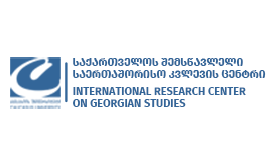The International Research Center for the Study of Georgia was launched at the Caucasus School of Humanities and Social Sciences in July of 2024.
The goal of the center is to:
- Conduct scientific research; study the historical past, cultural heritage, multiethnic and multicultural civilization of Georgia in the national, regional, Western/Eastern European and global contexts;
- Promote interdisciplinary research initiatives that explore Georgia’s historical, cultural, and broader significance in regional, European, and global contexts.
- Develope research-based academic programs, share new knowledge, and foster dialogue on topics related to Georgia (Caucasian, European, national, etc.).
- This includes the accumulation of innovative educational experiences in seminars, workshops, conferences, round tables and other formats, which will involve students, researchers, specialists and others.
- Develop international partnerships, national and international cooperation, which will contribute to increasing the importance of the center, both within the university and beyond.
- This involves establishing collaborations with similar/relevant university centersin the university space, research institutes, governmental and non-governmental organizations, and research networks across Georgia, Europe, and the USA.
The main functions of the CU-GRC Scientific Research Center are:
- Working on scientific grant projects;
- Organizing interdisciplinary conferences and symposiums annually or biennially, bringing together researchers and specialists from diverse fields such as history, cultural studies, and art history.
- Hosting a round table discussion on historical, cultural and other important issues;
- Fostering interdisciplinary dialogue by developing joint international research projects and internationalizing research;
- Developing new academic programs based on research;
- Organizing seminars, lectures and workshops;
- Inviting speakers and organizing and planning discussions and joint activities that engage not only university faculty and national experts but also internationally recognized scientists, students, and specialists.
- Initiating joint research and educational programs with relevant globally recognized research/educational centers.
CU-GRC has a governing body, an international board:
-
Philip Ross Bullock - is Professor of Russian Literature and Music at the University of Oxford. He is the author of a number of books, including The Feminine in the Prose of Andrey Platonov (2005), Rosa Newmarch and Russian Music in Late Nineteenth and Early Twentieth-Century England (2009), and Pyotr Tchaikovsky (2016). His edited collections include The Correspondence of Jean Sibelius and Rosa Newmarch, 1906-1939 (2011), Music’s Nordic Breakthrough: Aesthetics, Modernity, and Cultural Exchange, 1890-1930 (2021), Song Beyond the Nation: Translation, Transnationalism, Performance (2021), and Rachmaninoff and His World (2022). His research has been supported by the British Academy, the UK Arts and Humanities Research Council, and the Leverhulme Trust, and he has held visiting fellowships at Grenoble, Paris, and Princeton. In 2009, he received both the Philip Brett Award of the American Musicological Society and a Philip Leverhulme Prize for Modern Languages.
-
Peter J.Schmelz - PhD, a Professor, Head of the Comparative thought and literature department at Johns Hopkins University, specializes in twentieth and twenty-first century musics. His books include Such Freedom, If Only Musical: Unofficial Soviet Music during the Thaw (Oxford, 2009); Alfred Schnittke’s Concerto Grosso no. 1 (Oxford, 2019); and Sonic Overload: Alfred Schnittke, Valentin Silvestrov, and Polystylism in the Late USSR (Oxford, 2021). His work has received an ASCAP Deems Taylor Award, two ASCAP Deems Taylor/Virgil Thomson Awards, and the Otto Kinkeldey Award from the American Musicological Society. He has also received fellowships from the NEH, the American Academy in Berlin, the John Simon Guggenheim Memorial Foundation, and the Fulbright Program (Georgia). He is currently working on a number of projects, including an introduction to Ukrainian music (with Leah Batstone), a book on late Soviet experimental music, and a book of essays on Valentin Silvestrov. https://compthoughtlit.jhu.edu/directory/peter-j-schmelz/
-
Nana Sharikadze - PhD, is an Associate Professor (Affiliated) at Caucasus University. Her research encompasses a wide range of musical fields, including twentieth-century musical theatre and opera, experimental music, the interplay between politics and music, Georgian music, and Soviet music. Her current scholarly work centers on Soviet music, with a particular emphasis on colonization and decolonization discourses within musical and cultural contexts. In 2023, she authored the monograph An Introduction to Georgian Art Music: Sense-Making through Music, published by Cambridge Scholars Publishing. Between 2019 and 2023, Dr. Sharikadze held the position of Rector at the Tbilisi State Conservatoire. In 2024, she was awarded a Fulbright Scholarship at Johns Hopkins University and DAAD scholarship in 2012 at UDK Berlin . Notably, in 2022, she received the distinguished silver medal Zasłużony Kulturze Gloria Artis from the Ministry of Culture and National Heritage of Poland, becoming the first Georgian national to be recognized with this award for significant contributions to cultural life.
-
David Kolbaia - Historian, Kartvelologist. Assistant Professor at the University of Warsaw, Centre for East European Studies; Head of the Caucasus Studies at the Centre for East European Studies, University of Warsaw. He specializes in the history of the Caucasus, with a focus on the Georgian Church and late antique Christianity. His research also covers Old Georgian literature, particularly hagiography and hymnography. Since 2006, he has served as Co-Chair of the International Scientific Commission for the Heritage of St Grigol Peradze. Since 2002, he has been the Conference Director of the Saint Grigol Peradze International Caucasological Conference. In 1991, he founded and became editor of Pro Georgia. Journal of Kartvelological Studies. From 2017 to 2023, he chaired the Polish-Georgian Commission of Historians. He has been awarded the Knight’s Cross of the Order of Polonia Restituta for his contributions to scholarship and cultural heritage.

